Power Play's picks for the five power players of 2022
The 2022 political year saw federal leaders grapple with both unprecedented protests at home and how to respond to wartime needs abroad. It also saw some top politicians take on new positions of power, while Indigenous leaders took their calls for accountability directly to the Vatican.
Here are CTV News Channel Power Play's picks for the top five political power players of the year, in no particular order.
Ukrainian President Volodymyr Zelenskyy
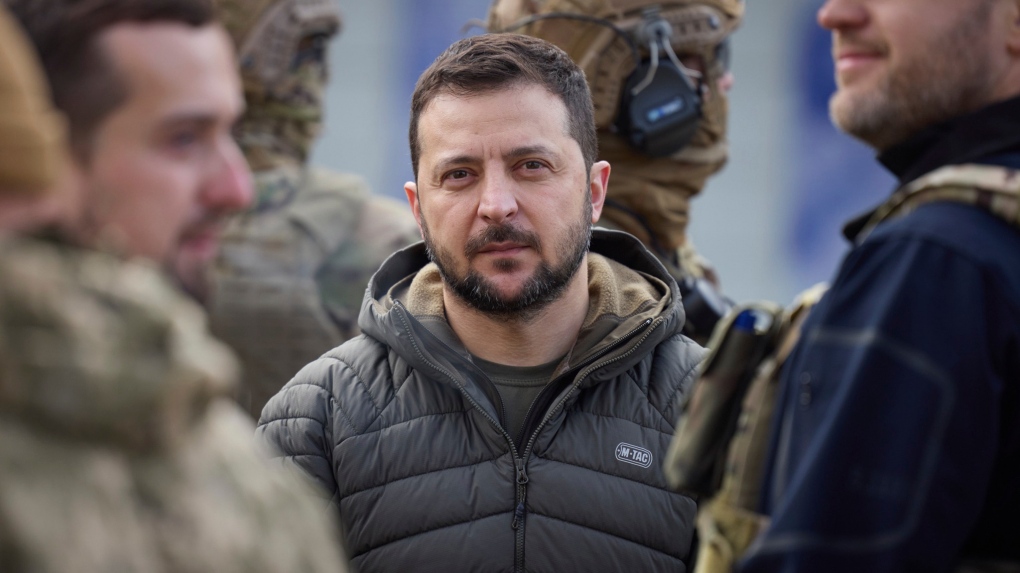 In this photo provided by the Ukrainian Presidential Press Office and posted on Facebook, Ukrainian President Volodymyr Zelenskyy seen during his visit to Kherson, Ukraine, Monday, Nov. 14, 2022. (Ukrainian Presidential Press Office via AP, File)
In this photo provided by the Ukrainian Presidential Press Office and posted on Facebook, Ukrainian President Volodymyr Zelenskyy seen during his visit to Kherson, Ukraine, Monday, Nov. 14, 2022. (Ukrainian Presidential Press Office via AP, File)
In February, the little-known leader of Ukraine was thrust into the global spotlight as he defended his country from Russia’s invasion and delivered chilling speeches from the heart of Kyiv as his homeland was withstanding constant bombardment.
For 10 months, Volodymyr Zelenskyy has managed to rally support from NATO countries despite Ukraine not being a member nation. His resolve has reflected his nation’s resistance in the face of Vladimir Putin’s attempted annexation of the entire country.
When the war first broke out and the United States offered to airlift Zelenskyy out of Ukraine, he famously responded: "I need ammunition, not a ride."
His consistent calls for nations to do more has led to Canada contributing more than $3.4 billion in assistance to Ukraine in both military and humanitarian aid. The war in Ukriane also put renewed focus on Canada's NATO spending commitments, seeing an increase become a key feature of the 2022 federal budget, with the target still not met.
His straightforward and emotional virtual address to Parliament in March brought the realities of war onto the floor of the House of Commons, while at home Zelenskyy’s nightly addresses to his people have been essential to keeping Ukrainians informed amid a world of disinformation.
In an interview on Power Play, Ukrainian ambassador to Canada, Yulia Kovaliv, said those speeches have been crucially important.
"Every single evening he is telling Ukrainians what is happening, what we've done to get the support of our partners, what has been done inside the country to repair the [power] grids to warm up the people," said Kovaliv.
NDP Leader Jagmeet Singh
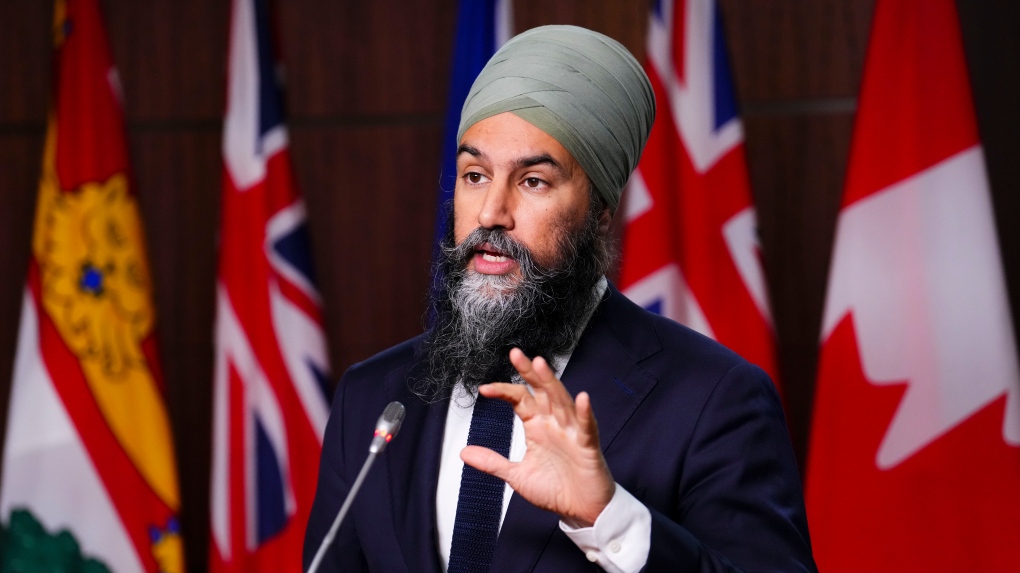 NDP leader Jagmeet Singh speaks to reporters on Parliament Hill in Ottawa on Wednesday, Dec. 7, 2022. THE CANADIAN PRESS/Sean Kilpatrick
NDP leader Jagmeet Singh speaks to reporters on Parliament Hill in Ottawa on Wednesday, Dec. 7, 2022. THE CANADIAN PRESS/Sean Kilpatrick
In March, NDP Leader Jagmeet Singh made the ultimate power play of the year in striking a supply-and-confidence agreement with Prime Minister Justin Trudeau. The agreement is slated to last until 2025 if, and only if, the Liberals keep up their end of the bargain by delivering on key policy planks.
In the first year of the deal, the NDP has forced the government to start what for now is a stop-gap dental benefit program for children under the age of 12 from low-income households, but is supposed to soon evolve into a more comprehensive national dental plan.
Two other wins for the NDP were the doubling of the GST tax credit and the one-time $500 top-up of the Canada Housing Benefit.
But as the health-care system continues to fray, the deal is showing to not be iron-clad.
"There might be a moment where after we've exhausted fighting and we've pushed as much as we can and there's no more this government's willing to do for people and the prime minister is no longer willing to listen to us or to be forced to do what's right, and at that point we'll make a decision," said Singh in an interview.
Conservative Leader Pierre Poilievre
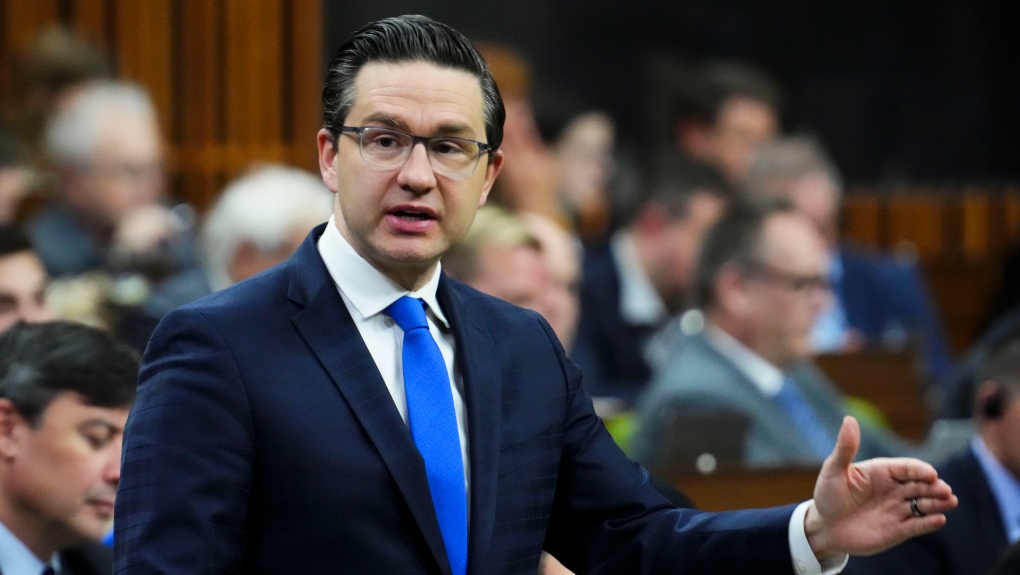 Conservative leader Pierre Poilievre asks a question during question period in the House of Commons on Parliament Hill in Ottawa on Wednesday, Dec. 14, 2022. THE CANADIAN PRESS/Sean Kilpatrick
Conservative leader Pierre Poilievre asks a question during question period in the House of Commons on Parliament Hill in Ottawa on Wednesday, Dec. 14, 2022. THE CANADIAN PRESS/Sean Kilpatrick
After a seven-month leadership campaign that saw intense attacks against his fellow candidates, Pierre Poilievre walked away with an easy first ballot victory. When the results were announced in September, the long-time Tory managed to secure 68 per cent of the available electoral points and came in as the first choice in nearly all of the country’s 338 ridings.
The decisive victory followed a divisive campaign, and that sentiment continued as Poilievre took his seat in the House of Commons opposite Trudeau.
With the cost-of-living crunch and inflation top issues for most Canadians, Poilievre and the Conservatives have hammered the Liberals in question period, claiming the pandemic spending has created the current economic climate. Firing back, Trudeau has repeatedly called out Poilievre's controversial views on using crypto-currency and his claim that he'd fire the Governor of the Bank of Canada.
Internally, Poilievre has managed to rally the Conservatives after two disappointing election results in 2021 and 2019, calling for his caucus to head into the new year standing on the side of "common people."
Emergencies Act Inquiry Commissioner Paul Rouleau
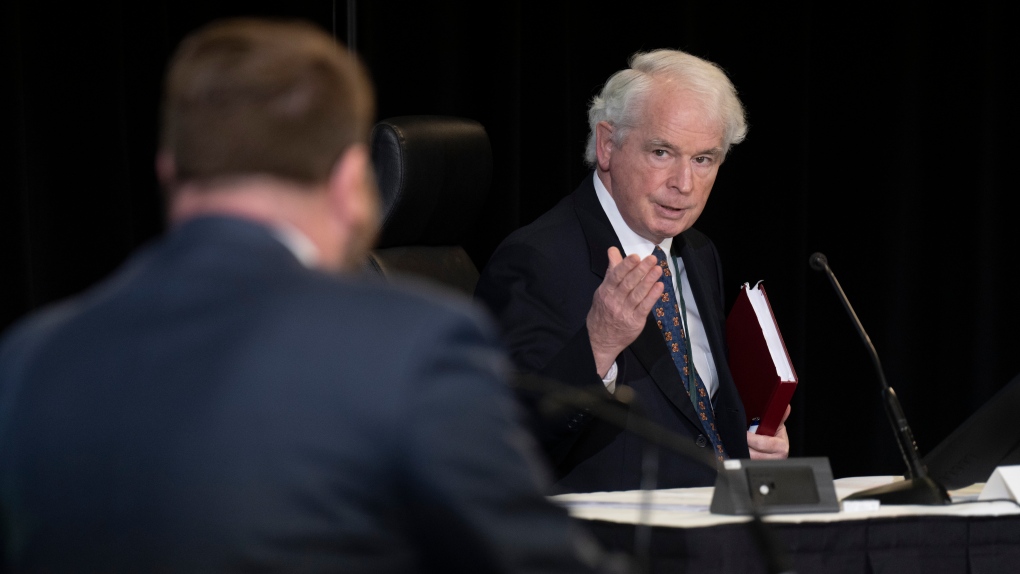 Commissioner Paul Rouleau speaks with Freedom Corp. counsel Brendan Miller before asking security to remove the lawyer from the Public Order Emergency Commission, in Ottawa, Tuesday, Nov. 22, 2022. THE CANADIAN PRESS/Adrian Wyld
Commissioner Paul Rouleau speaks with Freedom Corp. counsel Brendan Miller before asking security to remove the lawyer from the Public Order Emergency Commission, in Ottawa, Tuesday, Nov. 22, 2022. THE CANADIAN PRESS/Adrian Wyld
Making history as the first person to lead a national Public Order Emergency Commission as prescribed in the Emergencies Act, Paul Rouleau had a mammoth task ahead of him even before an unforeseen surgery delayed his work.
Ultimately, he and his team of commission counsel lawyers had six weeks to question more than 70 witnesses and parse through thousands of pages of documentation related to the federal government's decision to invoke the Emergencies Act to bring an end to the "Freedom Convoy" protests.
Despite the tall task, Rouleau managed to keep the commission's public hearings on track, even when the marathon hearings' cross-examinations became adversarial or conspiratorial.
While the fact-finding portion of the commission's work is now complete, Rouleau is facing down a February 2023 deadline to distill it all down and report back to Parliament. His findings are sure to be consequential, and any recommended changes will prompt interesting political debates ahead.
Indigenous leaders' push towards reconciliation
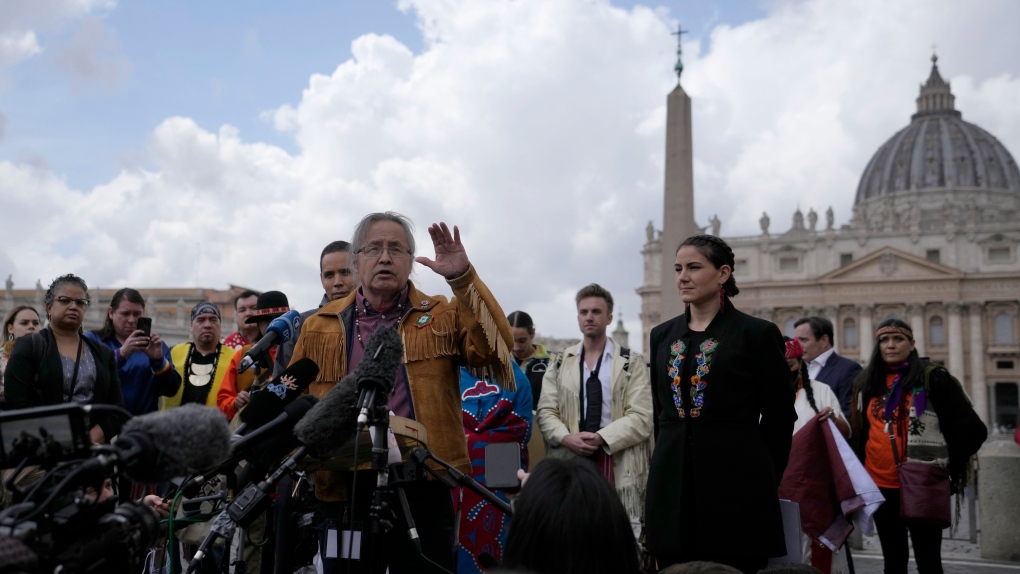 Gerald Antoine, center, First Nations NWT Regional Chief, is flanked by Natan Obed, president of Inuit Tapiriit Kanatami delegation, left, and Cassidy Caron, President of the Metis community, as they meet reporters in St. Peter's Square, at the Vatican, after their meeting with Pope Francis, Friday, April 1, 2022. (AP Photo/Alessandra Tarantino, File)
Gerald Antoine, center, First Nations NWT Regional Chief, is flanked by Natan Obed, president of Inuit Tapiriit Kanatami delegation, left, and Cassidy Caron, President of the Metis community, as they meet reporters in St. Peter's Square, at the Vatican, after their meeting with Pope Francis, Friday, April 1, 2022. (AP Photo/Alessandra Tarantino, File)
This year, a delegation of Indigenous leaders and residential school survivors travelled to the Vatican. A week of meetings culminated in the Pope apologizing to Indigenous delegates at a public audience.
Then, history was made as the Pope travelled to this country and made an apology on Canadian soil. The six-day visit took the Pope to Alberta, Quebec and the territory of Nunavut, and focused on publicly addressing the Catholic Church's role in Canada's residential school system.
Last month, the House of Commons unanimously agreed to recognize what unfolded inside residential schools was a genocide.
But, Indigenous leaders in this country have been clear: the apology and recognition of the wrongs done is only the start, not the end when it comes to what the responsibilities of federal government and institutions like the Catholic Church.
And, as a new report from the Yellowhead Institute indicates, Canada still has a long way to go when it comes to reconciliation. The report found that of the Truth and Reconciliation Commission's 94 calls to action, just 13 have been completed to-date, two of which got done this year.
"At this rate, it will take 42 years, or until 2065, to complete all the calls to action," it states.
Metis National Council President Cassidy Caron and Inuit Tapiriit Kanatami President Natan Obed both travelled to Rome and were with survivors when the Pope came to Canada. In an interview, the two Indigenous leaders spoke about how the apology was a “culmination of decades of work,” that meant something different to each person.
Now, they said, Canadian officials need to keep pushing down the road to reconciliation.
"From a systemic perspective, and from a relationships perspective, it also unlocks the potential to do more work together," Obed said.
IN DEPTH

Budget 2024 prioritizes housing while taxing highest earners, deficit projected at $39.8B
In an effort to level the playing field for young people, in the 2024 federal budget, the government is targeting Canada's highest earners with new taxes in order to help offset billions in new spending to enhance the country's housing supply and social supports.
'One of the greatest': Former prime minister Brian Mulroney commemorated at state funeral
Prominent Canadians, political leaders, and family members remembered former prime minister and Progressive Conservative titan Brian Mulroney as an ambitious and compassionate nation-builder at his state funeral on Saturday.
'Democracy requires constant vigilance' Trudeau testifies at inquiry into foreign election interference in Canada
Prime Minister Justin Trudeau testified Wednesday before the national public inquiry into foreign interference in Canada's electoral processes, following a day of testimony from top cabinet ministers about allegations of meddling in the 2019 and 2021 federal elections. Recap all the prime minister had to say.
As Poilievre sides with Smith on trans restrictions, former Conservative candidate says he's 'playing with fire'
Siding with Alberta Premier Danielle Smith on her proposed restrictions on transgender youth, Conservative Leader Pierre Poilievre confirmed Wednesday that he is against trans and non-binary minors using puberty blockers.
Supports for passengers, farmers, artists: 7 bills from MPs and Senators to watch in 2024
When parliamentarians return to Ottawa in a few weeks to kick off the 2024 sitting, there are a few bills from MPs and senators that will be worth keeping an eye on, from a 'gutted' proposal to offer a carbon tax break to farmers, to an initiative aimed at improving Canada's DNA data bank.
Opinion

opinion Don Martin: Gusher of Liberal spending won't put out the fire in this dumpster
A Hail Mary rehash of the greatest hits from the Trudeau government’s three-week travelling pony-show, the 2024 federal budget takes aim at reversing the party’s popularity plunge in the under-40 set, writes political columnist Don Martin. But will it work before the next election?
opinion Don Martin: The doctor Trudeau dumped has a prescription for better health care
Political columnist Don Martin sat down with former federal health minister Jane Philpott, who's on a crusade to help fix Canada's broken health care system, and who declined to take any shots at the prime minister who dumped her from caucus.
opinion Don Martin: Trudeau's seeking shelter from the housing storm he helped create
While Justin Trudeau's recent housing announcements are generally drawing praise from experts, political columnist Don Martin argues there shouldn’t be any standing ovations for a prime minister who helped caused the problem in the first place.
opinion Don Martin: Poilievre has the field to himself as he races across the country to big crowds
It came to pass on Thursday evening that the confidentially predictable failure of the Official Opposition non-confidence motion went down with 204 Liberal, BQ and NDP nays to 116 Conservative yeas. But forcing Canada into a federal election campaign was never the point.
opinion Don Martin: How a beer break may have doomed the carbon tax hike
When the Liberal government chopped a planned beer excise tax hike to two per cent from 4.5 per cent and froze future increases until after the next election, says political columnist Don Martin, it almost guaranteed a similar carbon tax move in the offing.
CTVNews.ca Top Stories

Liberal MP says she's leaving politics over disrespectful dialogue, threats, misogyny
Liberal MP Pam Damoff says she won't run again in the next federal election, saying she has experienced misogyny, disrespectful dialogue in politics and threats to her life.
Concerns about Plexiglass prompt inspections at some Loblaws locations in Ottawa
Inspections are underway at more than one Loblaws location in Ottawa after complaints were filed about tall Plexiglass barriers.
Federal employees will be required to spend 3 days a week in the office
Starting in September, public servants in the core public administration will be required to work in the office a minimum of three days a week. The Treasury Board Secretariat says executives will need to be in the office four days per week.
OPP officer said 'someone's going to get hurt' before wrong-way Hwy. 401 crash
As multiple Durham police cruisers were chasing a robbery suspect on the wrong side of Highway 401 Monday night, an Ontario Provincial Police officer shared his concerns, telling a dispatcher, "Someone's going to get hurt."
Ont. woman who faked pregnancy to defraud doulas arrested again on similar charges
Victims of a Brantford, Ont., woman who was sentenced to house arrest earlier this year for defrauding and deceiving doulas say they’re not surprised she’s been apprehended again on similar charges.
Five human skeletons, missing hands and feet, found outside house of Nazi leader Hermann Göring
Archeologists have unearthed the skeletons of five people, missing their hands and feet, at a former Nazi military base in Poland.
Poilievre returns to House unrepentant for calling Trudeau 'wacko,' Speaker not resigning
An unrepentant Pierre Poilievre returned to the House of Commons on Wednesday to pepper the prime minister about his drug decriminalization policies after being booted the day prior for refusing to take back calling Justin Trudeau 'wacko' over his approach to the issue.
Construction begins on LGBTQ2S+ national monument in Ottawa
Shovels have hit the ground for constuction on Canada's LGBTQ2S+ national monument in Ottawa.
B.C. man awarded $5,000 in damages in first-of-it-kind intimate image case
In a first-of-its-kind case, a B.C. tribunal has ruled on a dispute involving the non-consensual sharing of intimate images, awarding damages and issuing orders that the photos be destroyed and taken offline.
Local Spotlight

Here's how one of Sask.'s largest power plants was knocked out for 73 days, and what it took to fix it
A group of SaskPower workers recently received special recognition at the legislature – for their efforts in repairing one of Saskatchewan's largest power plants after it was knocked offline for months following a serious flood last summer.
Quebec police officer anonymously donates kidney, changes schoolteacher's life
A police officer on Montreal's South Shore anonymously donated a kidney that wound up drastically changing the life of a schoolteacher living on dialysis.
Canada's oldest hat store still going strong after 90 years
Since 1932, Montreal's Henri Henri has been filled to the brim with every possible kind of hat, from newsboy caps to feathered fedoras.
Road closed in Oak Bay, B.C., so elephant seal can cross
Police in Oak Bay, B.C., had to close a stretch of road Sunday to help an elephant seal named Emerson get safely back into the water.
B.C. breweries take home awards at World Beer Cup
Out of more than 9,000 entries from over 2,000 breweries in 50 countries, a handful of B.C. brews landed on the podium at the World Beer Cup this week.
Kitchener family says their 10-year-old needs life-saving drug that cost $600,000
Raneem, 10, lives with a neurological condition and liver disease and needs Cholbam, a medication, for a longer and healthier life.
Haida Elder suing Catholic Church and priest, hopes for 'healing and reconciliation'
The lawyer for a residential school survivor leading a proposed class-action defamation lawsuit against the Catholic Church over residential schools says the court action is a last resort.
'It was instant karma': Viral video captures failed theft attempt in Nanaimo, B.C.
Mounties in Nanaimo, B.C., say two late-night revellers are lucky their allegedly drunken antics weren't reported to police after security cameras captured the men trying to steal a heavy sign from a downtown business.
Fergus, Ont. man feels nickel-and-dimed for $0.05 property tax bill
A property tax bill is perplexing a small townhouse community in Fergus, Ont.









































